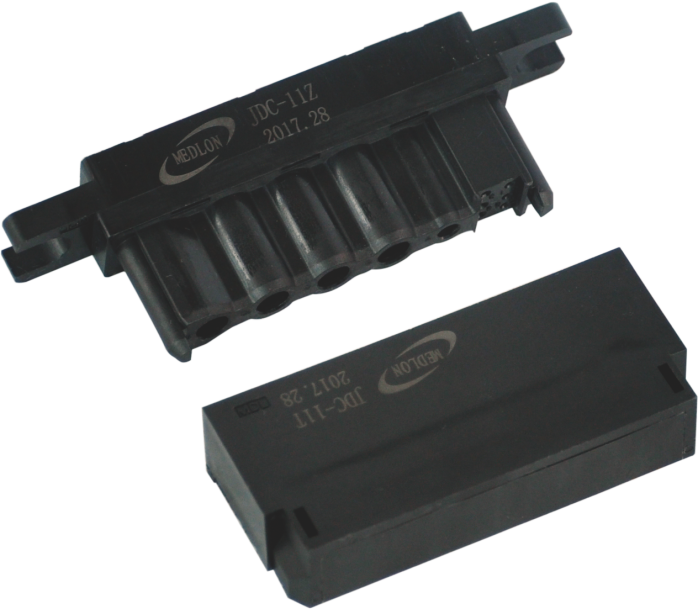



feature: Input voltage: maximum 220V, minimum 110V Output voltage: generally 5V or 12V Input current: Varies according to output voltage and load power Output power: depends on load capacity and output voltage Working frequency: generally 50Hz or 60Hz Advantage: 1. Versatility: Combination AC-DC and split power options are available, and the module can be configured to fit most designs 2. Convenient and flexible: easy to maintain and replace. 3. Safe and reliable: waterproof, dustproof and durable, 4. Quick connection: plug-in connection, can be quickly connected and disconnected, convenient for daily use 5. Multiple interface options: such as circular connectors, square connectors, threaded connectors, etc.
Specifications
| Component Type | 16-pin power connector |
| Gender | Header/Receptacle |
| Header Pin Pattern (Left to Right) | Power/Signal |
| Number of Contacts (Power) | 4 |
| Number of Rows (Power) | 1 |
| Number of Contacts (Signal) | $keyworrd{12} |
| Number of Rows (Signal) | 5 |
| Termination Style | Solder To Board |
| Orientation | Right Angle |
| Pitch (Power) | 6.35mm (0.250in) |
| Pitch Signal) | 2.54mm (0.100in) |
| Current Rating | $keyworrd{13}A max. for One Powered Contact |
| Resistance (Power Contact) | Maximum for mated pair is 2mΩ |
| Resistance (Signal Contact) | Maximum for mated pair is 20mΩ |
| Dielectric Withstanding Voltage | $keyworrd{14}V DC for power ; $keyworrd{15}V DC for signal contacts |
| Durability (Mating cycles) | $keyworrd{16} Mating Cycles |
| Operating Temperature Range | -$keyworrd{13}°C to +125°C |
| Material Housing | PPA, glass fiber reinforce, UL94V-0 |
| Plating Contact area | 0.76μm (29.921μin) Gold |
| ail Plating (Signal) | 1.98μm (78μin) Tin |
| Tail Plating (Power) | 1.98μm (78μin) Tin |
| Guide Feature | Guide Pin Pocket |
| Packaging | Cartons or Tray |
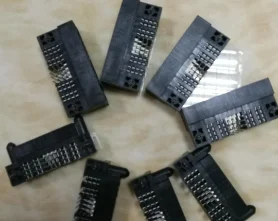
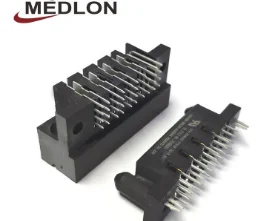
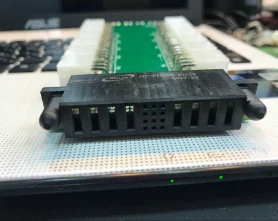
1.What kind of material is commonly used for making 16-pin power connectors?
We focus on innovation and continuous improvement to maintain a competitive advantage. Power connectors are typically made from metals such as copper, aluminum, and brass, as well as plastics such as nylon and polycarbonate.
2.Are there any options for tool-less installation of 16-pin power connectors?
Yes, there are several options for tool-less installation of power connectors. These include push-in connectors, twist-lock connectors, and snap-in connectors. Push-in connectors are the most common type of tool-less power connector and are designed to be inserted into a power socket without the need for any tools. Twist-lock connectors are also available and are designed to be twisted into place. Finally, snap-in connectors are designed to be snapped into place without the need for any tools.
3.How important is the overall quality of a 16-pin power connector?
Being one of the top 16-pin power connector manufacturers in China, We attach great importance to this detail. The overall quality of a power connector is very important. Poor quality connectors can cause electrical problems, such as shorts, arcing, and overheating, which can lead to equipment failure or even fire. High-quality connectors are designed to provide reliable, safe connections and are built to last.
4.Can 16-pin power connectors handle power surges or fluctuations?
We focus on teamwork and communication to achieve common goals, We attach great importance to this detail. Yes, power connectors can handle power surges or fluctuations. However, it is important to use the correct type of power connector for the application. Some power connectors are designed to handle higher levels of power surges or fluctuations than others.
5.About 16-pin power connector production skills training
Power connector production skills training is designed to help workers learn the skills needed to produce power connectors. This type of training typically covers topics such as the types of power connectors available, the tools and materials needed to produce them, and the steps involved in the production process. It may also include instruction on safety protocols and quality control measures. Training may be provided in a classroom setting or online.

6.Can 16-pin power connectors be quickly and easily disconnected?
We maintain a certain amount of R&D investment every year and continuously improve operational efficiency to provide better services to our cooperative customers. Yes, power connectors can be quickly and easily disconnected. Many types of power connectors feature a quick-release mechanism that allows them to be disconnected with minimal effort.
7.How do you identify the proper orientation for a 16-pin power connector?
We maintain a certain amount of R&D investment every year and continuously improve operational efficiency to provide better services to our cooperative customers. The proper orientation for a power connector can be identified by looking at the shape of the connector and the corresponding port. The shape of the connector should match the shape of the port, and the pins should line up with the holes in the port. Additionally, the connector should have a notch or other indicator that shows which side should be facing up.
8.What is the typical insertion and extraction force for a 16-pin power connector?
We continuously upgrade our skills and knowledge to adapt to changing 16-pin power connector market needs. The typical insertion and extraction force for a power connector will vary depending on the type of connector and the application. Generally, the insertion force should be between 0.5 and 2.5 pounds, while the extraction force should be between 0.5 and 5 pounds.
9.Can 16-pin power connectors be used for both AC and DC power?
We have established a good reputation and reliable partnerships within the 16-pin power connector industry. No, power connectors are designed to be used for either AC or DC power, but not both.
10.What is the expected lifespan of a 16-pin power connector?
We continuously upgrade our skills and knowledge to adapt to changing 16-pin power connector market needs. The expected lifespan of a power connector depends on the type of connector and the environment in which it is used. Generally, power connectors are designed to last for many years, but in some cases, they may need to be replaced after a few years of use.
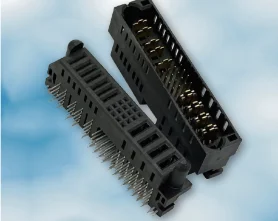
11.How do you select the appropriate locking mechanism for a 16-pin power connector?
1. Consider the application: The type of locking mechanism you choose should be based on the application and the environment in which the power connector will be used. For example, if the connector will be used in a harsh environment, you may want to choose a locking mechanism that is more robust and resistant to corrosion. 2. Consider the size: The size of the power connector should also be taken into account when selecting a locking mechanism. If the connector is too small, then a locking mechanism that is too large may not fit. 3. Consider the cost: The cost of the locking mechanism should also be taken into account when selecting the appropriate locking mechanism for a power connector. If the cost is too high, then it may not be feasible to use the locking mechanism. 4. Consider the safety: The safety of the power connector should also be taken into account when selecting the appropriate locking mechanism. If the locking mechanism is not secure enough, then it could lead to accidental disconnection of the power connector.
12.What is the typical voltage and current rating for 16-pin power connectors?
16-pin power connector is not a product only, but also can help you comes to money-making. The typical voltage and current rating for power connectors depends on the type of connector being used. For example, a standard IEC 60320 C13 connector is rated for 10A at 250V.
13.Are there any environmentally-friendly options for 16-pin power connectors?
Our company has many years of 16-pin power connector experience and expertise. Yes, there are several environmentally-friendly options for power connectors. These include connectors made from recycled materials, connectors with low-impact manufacturing processes, and connectors with low-emission designs. Additionally, some connectors are designed to be more energy efficient, reducing the amount of energy used during operation.
14.Are there any compatibility issues when using 16-pin power connectors from different manufacturers?
Our 16-pin power connector products undergo strict quality control to ensure customer satisfaction. Yes, there can be compatibility issues when using power connectors from different manufacturers. Different manufacturers may use different sizes, shapes, and pin configurations for their power connectors, which can lead to incompatibility issues. Additionally, some manufacturers may use proprietary connectors that are not compatible with other brands. It is important to check the specifications of the power connectors before purchasing to ensure compatibility.
15.Are there any safety standards that 16-pin power connectors have to meet?
We operate our 16-pin power connector business with integrity and honesty. Yes, power connectors must meet safety standards set by the International Electrotechnical Commission (IEC). These standards cover a range of topics, including electrical safety, mechanical strength, environmental protection, and electromagnetic compatibility.

16.About 16-pin power connector delivery date
The delivery date for power connectors will depend on the type of connector, the quantity, and the supplier. Generally, most suppliers will provide an estimated delivery date when the order is placed. If the order is urgent, some suppliers may be able to provide a faster delivery time.
Tag:4 pin ide power connector,2 x 8-pin power connector,3 pin tractor power connector,2070 power connector,car radio power connector